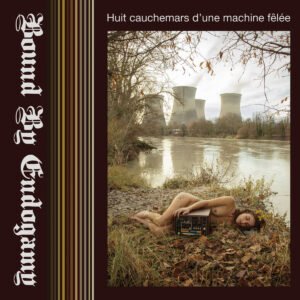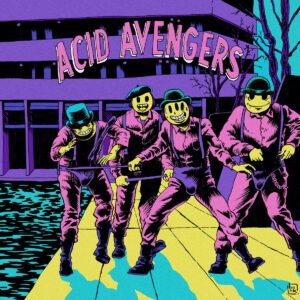Cover photo: Titouan Massé
If we had to bet on a mindblowing concert at this year’s Ombra, our money would have gone to the Swiss duo Bound By Endogamy. Perhaps because of their punk past or because of the energy they already manage to transmit on record, it seemed obvious to us that their concert was going to be a safe bet. We got to know the duo formed by Kleio Thomaïdes and Shlomo Balexer thanks to the album that Màgia Roja co-released and, with every record they have released since, they have never ceased to surprise us. After their impressive performance at the Barcelona festival, we wanted to find out a little more about this duo who will undoubtedly occupy your hearts.

Photo: Gil Álvaro De Lemos
—The name of the band comes from a private joke about the punk scene in Géneve where everybody knows everybody. Do you think that the EBM/ Synth punk scene is similar/so small?
— Actually, it wasn’t really a joke. It was more an ironic observation about the nature of our relationship in the framework of the local punk scene. When we say that everyone knows everyone, it’s in the biblical sense of knowing. Everyone has sex with everyone within a restricted socio-cultural circle (we’re not passing moral judgment on this).
The decisive aspect in this observation is not the size of the scene, but the homogeneity of the individuals who make it up. The people who gravitate around the EBM/synth punk scene you’re talking about, we call them goths, to schematize. Conforming to a well-defined dress code and rallying around an exclusive aesthetic imaginary and musical current is obviously a similarity that goths share with punks, and other urban tribes that emerged in the late 70s and 80s.
Today, these currents, which were clearly compartmentalized at the time, are thrown jumbled into a global « queer » wave. There are still unconditional devotees, purists of the punk and gothic scenes, but generally speaking, music enthusiasts have a finger in every pie. And so do artists.
At first sight, this evolution could be seen as a rather positive trend towards openness and cross-fertilisation, but we think that in reality it stems above all from a form of opportunism. It is part of the capitalist mania inherent in the entertainment society to reappropriate everything that can be marketed. The treasures of counter-cultures and protest cultures are desecrated, crushed, emptied of their meaning and sold to consumers by pseudo-artists who wear the attributes and brandish the codes of our movements without having any connection with them. The souls of these movements are dissolved in a big cauldron where all the tastes come together to form a lukewarm, tasteless mishmash that we are served at every meal.
And this phenomenon, which everyone has already pinpointed in the mainstream music industry, is also at work among independent artists, more or less underground.
We know in advance that we won’t get unanimous agreement on this conclusion, but we believe that punks – and goths – are being dispossessed by a mechanism of cultural appropriation, guided by commercial, aesthetic and ideological interests. A spoliation of a modern cultural heritage, analogous to that which struck down the colonized peoples of the Americas and Africa. With, implicitly, intensities of related violence, specific to each particular historical context.
And if you’re not a member of one of those communities that’s been plundered, you’ll never know in your own flesh how painful it is to see uneducated clowns walking down the street, disguised as you, although you have nothing in common with them 🙂
Finally, it’s perhaps here that we reach a point where the name of our project takes on a relevant meaning in an unexpected way. Indeed, punks are bound together by invisible ties of bestial essence, which enable them to recognize the genuine members of their society and unmask the imposters, beyond appearances of dress, beyond speeches, postures and gimmicks.
What was the question again?

Photo: Gil Álvaro De Lemos
—Going back to your origins, how did you move from punk to electronics?
—It’s a very ancient story, dating back to the 2000s. Shlomo was living in a squat where a few networked computers were shared collectively among the inhabitants. On these computers was an open source DAW called Buzz. Shlomo played in very conventional punk rock bands at the time. For fun, he started producing rudimentary electronic versions of the songs he’d composed with these punk bands. [One of the purposes of this operation was to record these electronic versions on mini-discs. He would then play them on a small amp to accompany himself when he went panhandling in the street, singing pedophile songs a capella].
He continued this project live with a few friends and produced a kind of electro-punk for about ten years, without ever really taking an interest in electronic music. It was only in the mid-2010s that he got the idea of listening to something else than punk, oi! or hardcore. During this period, he started playing records at parties. And of course, an ebm track is always better received on a dance floor than an old grindcore one.
At the same time, Kleio was organizing quite a lot of gigs in Geneva, and she was also beginning to be in demand as a DJ. We found ourselves playing tunes together, sharing our discoveries and deepening our knowledge of electronic cultures with a common impulse.
—And what did you see in each other that make you want to start a project together?
—There are two elements that were important.
The first was our similar paths and musical references. We had the same background, comparable knowledge and experience of the punk and squat worlds. And then, we dived into the vast field of electronic music at the same time. We were driven by the same thirst for discovery and our tastes coincided.
The second element was our shared availability. Our respective food jobs didn’t take up much space in our lives. We had time to create something together.
—You are influenced by the music of labels like Vinyl on demand, Minimal Wave, Dark Entries, Domestica or Mannequin. They have been reissuing a lot of 80s electronic cassette music. I am also a big collector of those labels, what do you find interesting in those bands of the past? Their purity? Their sound?
—Haha, that’s exactly it! Their purity, their innocence, their sincerity! And their hand-crafted sound.
Generally speaking, music and films from the past have the magical power to make us travel back in time. They are charged with an atmosphere that today’s productions can only try to imitate. From a formal point of view, we can list a few characteristics that distinguish the artists of the 80s from contemporary artists.
For a start, they didn’t have instant access to all the music happening in their time, as we do today. They were less subject to the effects of fashions. As a result, their compositions were more personal, more daring and often genially clumsy, even wobbly. They were also more limited in their means of production, which favored their creativity. When you’ve only got two hardware machines and a 4-track tape recorder at your disposal to build an album, you’re forced to show a minimum of ingenuity if you want to come up with something interesting.
Musicians in the 80s were also obliged to mature and develop their projects over longer periods before launching into the fastidious production of a cassette or a vinyl record. Today, you can instantly dump any crap on the Internet that you’ve produced in a morning, whereas in the past, musicians allowed time to imprint a singular legacy on their existence. This lived experience would then permeate their music, giving it a particular flavor. What can you produce or tell of interest if you haven’t taken the time to go through life stories or existential dramas?
It’s also worth noting that, at the time, you were still out of the norm when you claimed to be a musician and set out to distribute your work independently. You had to have a certain audacity and character, which inevitably showed through in your artistic output. Being an artist was truly the path to marginality. Today, with the evolution of mores and the democratization of means of production and distribution, you’re in absolute normality when you embark on an artistic « career ». In 2024, everyone is an artist. There’s nothing more banal or boring than an artist. The real freaks these days are mathematicians, farmers and dentists. The rest are useless poseurs and shams.
And finally, one of the factors that contributes most to the charm of these musicians of the past is that they distill a form of romanticism inherent in the stories of cursed artists. They were mostly ignored and lived in mysterious anonymity, in obscurity. And it’s only after decades of indifference that some of their productions are being unearthed, reconsidered and elevated to cult status by new generations of music lovers in search of authenticity in a world of artifice.

Photo: Olivier Jaquet
—I guess that’s also part of the reason why you use analogue gear. In this eternal discussion about what´s better, digital or analogue, what’s your point of view?
—Is there really a debate about this? We thought everyone preferred analog sound, haha! One of the rare moments when we said we preferred digital was for a matter of support. When we had our eponymous album mastered for pressing, we realized that it was impossible to preserve the full stereo of our bass, for physical reasons specific to the vinyl format. This slightly altered the final sound of the record. And if you ask us which version we prefer, we’ll tell you that the digital files of the record distributed on Bandcamp sound better than the record. Which is hard to admit for vinyl-worshipping fools like us.
—A concert of DAF was one of the starting points of the band and I guess it was key in the way you present the band live: one singing and live drums. We are big fans of Gabi Delgado’s band (as we always say, we name our son after him, so we have our own little Gabi Delgado at home). What did you find interesting in their performance and their music?
—We loved how Gabi filled the entire front of the stage on his own. There was no need for anything or anyone else. Just his energy and hyper-communicative performance. And Robert who backed him up on the drums.
A friend who was there told us he’d seen a show a few years back, where Robert came on stage with a briefcase from which he’d taken out a CD. He inserted the CD into a player, and they went through the whole set simply playing over the electronic tracks on the disc. It’s probably not the exact process they used for the concert we saw in 2018, but in broad strokes, that’s what we witnessed.
And we were completely seduced by the awesome efficiency of their minimalist setup.
—In a more personal level, how living in squats have modulated your personalities? Is it difficult to create music in a squat?
—We both started living in squats around the age of 16. That’s an age when you’re still building your identity. So you soak up everything you live and experience like a sponge. The older people Shlomo stayed with ended, or often short-circuited, the education his parents had tried to give him. In short, the basic teaching was the rejection of all authority, and the attempt to escape all constraint by any means necessary. Against a backdrop of community living and coping.
For Kleio, it was a little different. She started squatting in Lyon, with just a bunch of girls of roughly the same age. They had no one to show them how to break open building entrances, or to play the role of rock’n’roll big sisters. Kleio then moved back to Geneva, where she continued to squat in a Wagenburg.
We were lucky enough to have a lot of squats that could last several years in Geneva. As a result, we were able to plan medium-term projects. A music room was easy to set up with several people. Most of the squats we lived in and many of the squats we frequented had either a rehearsal space or even a concert space, which encouraged musical inclinations. Amps, drums, sound systems and computer equipment were shared. And even if there was no music room in your occupied house, you could have access to the facilities of another squat. Most of them were connected and interacted in a kind of network called Intersquat.
One of the other advantages of squatting is that your direct neighbors are supposed to be your mates, so in theory there’s very little chance of them calling the cops if they’re disturbed by the noise you’re making with your music haha! On the other hand, with this type of housing structure, it’s often harder to envisage the long term. Everything you build is condemned to a form of precariousness and impermanence.
And now that we’ve assembled a home studio with a number of relatively precious and fragile machines, we have to admit that we prefer to keep them in a secure rental space, with a more or less constant temperature and humidity level, and the guarantee that any cop can’t come and smash up your place and throw your stuff out of the window if it suits him.

Photo: Merlin Smrd
—Being from Switzerland I guess that Lux Rec was the right choice for a label. Also, Kleio was part of Savage Grounds with Daniele Cosmo (there is a question about that at the end). I think that Lux Rec, Detriti, Oráculo, among others are releasing a lot of interesting and groundbreaking music at the moment. Do you think we are living a golden moment for the kind of electronic punk that you are making?
—You don’t need to have studied political science to see that the period we’re currently living in has certain significant points in common with the 80s, the years that saw the birth of postpunk, new wave and their distinctive electronic sounds.
In geopolitical terms, there’s the oppressive climate of the Cold War – or rather, the lukewarm one? – between Russia and NATO, and the same threat of nuclear apocalypse. We also see the same kind of worrying rise of far-right parties in every European country. As a bonus compared to the 80s, today we’ve got the climate crisis, Covid 19 which has come and gone, a genocide that has been going on for over a year in Palestine, and which leaves all observers with a heart powerless to do anything concrete about it, a Western population that’s getting dumber and dumber because people would rather spend their days watching crap on their cell phones than reading books, and the liberticidal model of the Chinese steamroller that’s lurking around the corner.
These elements, which contribute to the highly anxiogenic atmosphere of our times, are certainly ingredients conducive to the production of pessimistic, desperate, disenchanted music, and could explain the emergence of a possible second golden age for a post-punk current with depressive tendencies, of which Lux Rec, Detriti and Oráculo would be the relays.
That said, on a personal level, we’ve been living and feeling this electronic punk or post-punk revival for the last ten years or so.
—Your first single was Walk with a Tumored Dog, in a more melancholic minimal wave vibe. Was this the first direction you wanted to take as a band? You said that you first wanted to release an EP like this, right?
—At the beginning of the project, we went in an oldschool ebm direction. Then, in 2020, we repaired the old Casiotone 403 that Shlomo’s father had acquired in the 80s. And when we had this synth in our hands, we thought it was perfect for producing the kind of minimal wave à la Walk with a Tumored Dog. Especially its integrated drum machine patterns. And yes, in the course of a year, we composed four tracks in this style that we would have loved to release all together on an EP. But the labels we worked with had other plans, and we had to go along with them.
—I like the idea of having the same song sung by each of you. I am talking, of course, of “Lettre to Lauren”, Where did you get the idea of doing this?
—It’s just that Shlomo had originally composed the song on his own. And he had recorded some vocal parts on it. But for it to be a BBE composition, it had to be Kleio’s voice. So we re-recorded her version. That’s one of the advantages of working in a home studio. You can easily tinker and experiment with alternative renditions of a track.
—The following release was your first full album (although released later) What happened that it took you so long to release it?
—If you want all the details of the story, what happened was that in early 2022, a collective label hooked us up to make an 8-track LP. At the time, we had around fifteen mature tracks in stock that could be released on record. Together with them, we selected the ones we felt were the best. The first factor that complicated the making of the record was that on the studio versions of our tracks, we use drum machines. We like working with these machines and we like their sound. But the people at the label wanted us to record the acoustic drum parts on the tracks, the ones we add when we play live shows. We said why not.
They called a friend of theirs who has a professional studio, and booked two days to rerecord and mix the eight tracks. The problem is that this buddy is used to working with psychedelic rock drummers who have completely mastered their instrument, so he did some rough takes on which you could hear all the drum elements on each separate instrument track. That’s no trouble when you record drums on a one-shot track. On the other hand, it’s not at all suitable for re-editing inaccuracies and recalibrating the various drum elements to the regular, mechanical tempos of the machines. Shlomo had to re-record the snare and toms separately, track by track, in our rehearsal room, and mix the whole mess with the studio takes. It was fucking monkey work.
Another time-consuming part of the job was that, in order to obtain an album with a roughly coherent sound, we had to homogenize the mixes of the eight tracks that had been recorded and composed at irregular intervals over a period of three years. Shlomo did this himself with his limited resources as a self-taught sound technician, and it took longer than if a professional had done the job. But we knew exactly what sound we wanted, and it didn’t make sense to pay someone else to do a job that wouldn’t have satisfied us.
Once the record was finally ready, we couldn’t come to an understanding with the label about the visuals for the cover. They wanted to impose the artwork of a graphic designer they were used to working with. So, at the end of the whole process, we finally decided by mutual agreement to drop the collaboration on this record release.
A few months later, we had a (vegan) kebab with Cyril from Bongo Joe to discuss the vinyl reissue of our EP released by Dead Channel in March 2023. And that’s when he hooked us up to release a new album. Just as well, we had one in the pipeline. We’ll spare you the details of the ensuing problems. We had to redo the test pressings three times… But in the end, after all this saga, we got a record that people seem to enjoy.
 —The A-side has a more EBM/industrial sound and the second is a bit more minimal wave. Do you think that each side is representative of one of you or you both are more or less interested in the same music?
—The A-side has a more EBM/industrial sound and the second is a bit more minimal wave. Do you think that each side is representative of one of you or you both are more or less interested in the same music?
—No, we basically like the same music. Shlomo just has a soft spot for cheesier, popier productions and power electronics. And Kleio is the guardian of good taste who redirects the shot when we’re heading for slopes that are too slippery.
—Kleio performance is quite punk in the first songs. Do you think that the influence of punk with stay always in your music? Once a punk, always a punk?
—Yes. In fact, we’re really doing post-punk in the literal sense of the word. We’re punks and we stay punks. But after twenty years of listening exclusively to this type of sound, and having done a bit of all the bollocks a punk needs to put on their CV, we’d probably come to the end of the road. So we try to explore new musical avenues with this identity baggage. And Kleio continues, purely by vocation, to flesh out her punk CV with more or less self destructive experiences.
—Also, the songs are in English only in that release. Do you prefer to sing in French, your mother language?
—The mechanisms of writing are obviously not the same in our mother tongue, French, or in a language we’re less fluent in, such as English. But we have no preference for one or the other, we take whatever comes most naturally with the inspiration, the topic or the message. Kleio also sometimes writes in Greek, the language of her father.
—Your music is quite difficult to describe. It´s not a straightforward and simply as most of synth punk and a track like “Nothing” can be described as minimalist, complex and experimental at the same time. What your aim when you compose music? How far do you let yourself go with the music of Bound By Endogamy?
—In most cases, before starting a project, we have in mind either an existing track, or an artist, or a style that serves as a starting point for guiding the direction of our work. And then, along the way, we may deviate from the initial objective and allow other influences to amalgamate with the current project. This can lead us to deliver the kind of multi-faceted track you describe. Shlomo usually lets himself be led astray quite willingly, while Kleio will try to maintain the course we’ve set ourselves. It’s interesting to observe that our behavior and roles tend to be reversed in everyday life.
—Last year at Ombra I met Viktor from Màgia Roja. He was delivering his latest releases to the guys from BFE and I asked him for a recommendation. He showed me Huit Cauchemars D’une Machine Fêlée and I followed his advice and bought it. You have played with Dame Area and have goood relations with them. How did you meet? I guess you four must share a lot of things in common.
the guys from BFE and I asked him for a recommendation. He showed me Huit Cauchemars D’une Machine Fêlée and I followed his advice and bought it. You have played with Dame Area and have goood relations with them. How did you meet? I guess you four must share a lot of things in common.
—Kleio organized a gig for them in Geneva, at the very beginning of their project, when they were still touring with a drummer. We saw them again the next two times they came back to play in our city. And then in 2023 Màgia Roja co-produced the vinyl reissue of our first EP, which had been released on tape by Dead Channel.
We later found ourselves booked with Dame Area for five dates in the span of a year, in Switzerland, Holland, Sweden and Germany. Over the course of our meetings, Viktor and Silvia have become real friends. We are always happy to see them on stage and spend time together. We usually have a good laugh. We appreciate their humour, their humanity, and our musical tastes are obviously convergent.
—Six Cauchemars D’une Machine Fêlée was better produced althoug you said that your evolution it’s toward a rawer sound. These six songs were later released, with two additional tracks, by Màgia Roja and Les Disques Bongo Joe, as you said before. Can you please tell us a bit more about the time of the composition of this album?
—These six tracks were composed and recorded one after the other in 2022. At the same time, we were working on the drum parts and the mix for our first album. It was tiresome and tedious. So creating the new tracks served as a kind of recreation, a much more stimulating task that reintroduced pleasure into our work.
—”Autoreduction” shows the influence of bands like Liliput/ Kleenex. Doing this interview I realised that they were Swiss, were they an early influence in your life? What did you find interesting in this now-considered classic band?
—In fact, the album we used as a reference for Autoreduction was Penis Envy by Crass. We were inspired by their famous hopping rhythms. And we added a pinch of swing. The theme of the tune – the looting of stores in organized groups – also resonates with the anarchist stances taken by Crass.
But we’re fans of Liliput/Kleenex too. We’ve always liked and sought out bands with female vocals. Maybe we liked them because they were rarer. Although we’re still far from a 50/50 ratio, there are more women and non-binary people on stage today. Unfortunately, it’s not always for the right reasons. It seems to us that for female musicians, popularity is too often correlated with physical appearance. This phenomenon is even more visible in the world of DJs.
And then there are the legitimate but awkward attempts to rebalance gender representation in events. We try to restore the balance with hammer blows, giving more importance to questions of ratio than to programming content, and we end up in absurd situations where a male musician like Anna Funk Damage is asked to play on a gig, just because an incompetent promoter thinks it’s a woman.
In the end, positive discrimination remains an inherently negative form of reductive distinction in our view. But this tendency to focus on form while neglecting substance is completely symptomatic of our age, subordinated to the cult of appearances.

Photo: Merlin Smrd
—The CR-78 was used in Huit Cauchemars D’une Machine Fêlée and also appeared in the cover. Do you have any kind of special attachment to this machine or to its sound?
—Yes, we cultivate a special love for our old drum machines. We don’t know why, but we revere drum machines more than synthesizers. Maybe because they have more identifiable sounds, more distinctive characters. And among our modest collection, the CR-78 is the most beautiful and precious. And incidentally, we also love the sounds she produces haha! Another drum machine close to our hearts is the DRM16 from Electro-Harmonix. You can hear her on our tracks “Lune” and “Killed By Shame”. And she’s inseparable from the sound of Bérurier Noir, the notorious french punk band that has been most important in Shlomo’s life.
—The track “00010 01110 01100 01111 10100 10011 00000 10011 01000 01110 01101” is a critic of a virtual society, also criticize in “Nothing”. Do you think that there is a way to go back to a more “human” society?
—Unfortunately we don’t. We think that on small scales, whether individual or collective, it’s possible to distance ourselves from our inhuman society, by settling outside the cities and by favoring modes of subsistence that make us as self-sufficient as possible. But on a more global scale, the psychopaths at the helm of the authoritarian plutocracies that shape our societies have no reason to steer us towards more humane systems. Their strategies and profits are directly linked to the dehumanization of our society. And everything indicates that they are not ready to give up the levers of their omnipotence.
Consequently, we can only applaud the initiatives of responsible citizens who are trying to remedy this unbearable situation. We’re notably thinking of Luigi Mangione, the courageous young man who shot and killed the CEO of United Healthcare on December 4, 2024 in New York City.
—You also do dj sets and radio shows, any new discoveries?
—Everyday, the new Hayter EP released by KRI.
The latest Lux Rec release: Abe Schwarz – Schwarze Leidensleider.
Tir Groupé, the Rixe EP, released this year.
Real Life, the new Silent EM LP.
Friendly Fire, the Alan Harman 7’’ released by Unrealistic Expectations this year.
DDE07, the SILF 7’’ released by Dalmata Daniel this year.
Wage Of Wrath, the new Kommando LP – a side-project of Thorofon – released by Ant-Zen.
The LPs Fragmented and Artiphon by Parallel Worlds, released this year by the English label DiN and the Icelandic label Móatún 7.
The comp Kosmoloko 3, released by Galakthorrö this year.
The digital EP Acid Moustache, self-released by Philipp Münch this year.
Lost Art, the PRZ LP, released by Cultivated Electronics this year.
Yacker, the latest Container LP, as efficient as ever, released by Alter, the label run by Helm.
The two latest L.F.T. EPs released this year on Pinkman and Osàre! Editions.
The Ready To Fog cassette by Fog Man.
The Sky Is The Floor, the latest album from The Horrorist, which he self-released digitally on bandcamp this year. It’s our favorite record of 2024, and we can’t understand why it hasn’t been put out in physical format. If we had a label, we’d be fighting to release this album on vinyl.
And everyone knows that Dame Area have released a great LP, Toda La Verdad Sobre Dame Area, ranked second best album of 2024 by Pitchfork.
Frustration and Le Prince Harry also released good albums this year. There are many more, but we can’t list them all.
—You have also released a split in Acid Avengers, a bit more danceable. Did you change the music to have a more acid sound just for this release? You said that those three tracks were recorded between 2020 and 2021, right?
music to have a more acid sound just for this release? You said that those three tracks were recorded between 2020 and 2021, right?
—We didn’t completely change our sound, as we’d already worked with a TB303 clone on some of our previous tracks. But yes, you’re kind of obliged to use this synth if you want to join the Acid Avengers series, it’s tacitly part of the contract.
And these are tracks that were actually written and recorded between 2020 and 2021.
By the way, it’s always frustrating to have to wait so long for your material to be issued. Partly because we’d be doing something completely different today if we were producing tracks for Acid Avengers.
—Your last EP was self-released and entitled Correspondances, The lyrics were written by women during a workshop in the context of a residency for artists organized by the social service of Genova. Can you please tell us more about this experience?
—The experience is described in some detail on the insert accompanying the EP. And you can read it on our bandcamp page. In short, as part of a residency, Shlomo led a writing workshop for retired people.
Three women took part in the workshop. He asked them to write a letter that would be impossible to send to its recipient. A letter impossible to address or formulate. The texts would then be used as lyrics for our compositions.
In the past, with BBE, we had already composed two cathartic songs whose function was to establish a form of utopian communication between two subjects. «Lettre à Lauren» addressed to an unemployment office advisor who was tormenting Shlomo. And «Tutor» written by Kleio to one of her best friends who committed suicide. Using these texts as examples, one of the workshop participants wrote to the beloved dog of her childhood. Her family had abandoned him when they left Portugal to live abroad. The dog had been hit by a car and died the day they moved. Another participant wrote a letter to the sewing teacher who had traumatized her as a child.
We were delighted to receive these dramatic, emotionally-charged texts. They set the scene in universes tinged with dreamlike imagery, and conjure up imaginings specific to the world of childhood. They’re perfect to put in relation with our sounds.
So we composed two new tracks with these letters, recorded them and released them on the Correspondances EP along with our two other tracks that had not yet been released on vinyl.
 —And Shomo, the Hospice Géneral help you in the past, can you tell us more about this?
—And Shomo, the Hospice Géneral help you in the past, can you tell us more about this?
—The Hospice Général is the social service that takes over in Geneva when your unemployment benefit runs out. Basically, you have a social worker who monitors your bank account and gives you money to pay your rent, food and medical expenses.
In France, musicians have the status of «intermittent entertainment worker», which means they receive a regular salary after a certain number of concert dates per year. But in Switzerland, no such structure exists to support musicians. The Swiss, who have no shortage of resources and always think they’re smarter than their neighbors, are more than 50 years behind the French in this area.
In Geneva, to try and get by, you need to set up a legal association with a committee, president, secretary and treasurer. And apply for occasional subsidies throughout the year from various funding bodies. It’s a hellish amount of administrative work on top of composing, recording, producing, rehearsing, booking, promoting and touring.
And in the end, many musicians on the professional circuit find themselves relying on social services to survive
—In the frame of some of you prom pics you hold a portrait of P. Jupiter. You produced a track with him for a Born Bad record shop compilation, La Tour Dieu. How do you feel about doing collaborations with other musicians? Any other artist you would like to work with?
—Collaborating with other musicians is an extension of our work that we enjoy. It brings fresh air to our own project, and puts us in touch with people we love and whose productions we appreciate.
We’ve already started tinkering on a couple of tracks with Mathieu from Leroy Se Meurt, the last few times he came to spend a vacation with us in Geneva. We plan to take this collaboration to the next level when our calendars synchronize, and release a mutant record resulting from the laboratory cross-fertilization of our two bands.
We also intend to extend our work with P. Jupiter to release an EP with him.
If we could arrange our time freely, we’d probably give priority to these projects. But unfortunately, the fast pace of our tour dates, the band’s production schedules and problems in our personal lives tend to postpone their realization.
—Kleio, you also do photography and filmmaking. I guess that the cover of Huit Cauchemars D’une Machine Fêlée was your idea. What points in common do you find between your artistic work and Bound By Endogamy?
—In fact, the cover of Huit Cauchemars D’une Machine Fêlée was Shlomo’s idea. He actually took the photo. I didn’t particularly want to appear naked on our album artwork. If someone had to be naked, I’d have preferred it to be him, haha! But he convinced me. The poetic argument outweighed the rest.
As for myself, I did the cover for our first 7’’, Walk With A Tumored Dog, published by Lux Rec.
I swear by analog. This photo was taken with a Sinar camera, in large 4-5 inch format, unlike Huit Cauchemars, which is a digital photo.
What my artistic work and BBE have in common is the materiality of analog, and my sensitivity to the grain of film and sound. Then, of course, there are the themes I tackle, which can be found in both media. For example, research into the presumed cerebral inferiority of women in medical and psychiatric circles at the end of the 19th century.
—Kleio you already played at Ombra with Savage Grounds a couple of years ago. You joined the band in 2021 and appeared in Hidden By The Night and Separation Shock. How is your experience with Daniele Cosmo’s band?
—My experience with Savage Grounds represents a fundamental step in my journey as a frontwoman.
Daniele had originally invited me to record vocals on two of his band’s tracks, and during the lockdown he asked me to come and sing spontaneously at one of their gigs. We’d never worked together before, so I just turned up, they improvised their live tracks as usual, and I improvised vocal parts on top. It was the first time I’d ever done that. At the end of the concert, they proposed that I officially join the band.
So I integrated the project in a way by being thrown into the ring. And that made me progress enormously, it forced me to let go. Since I never knew in advance what they were going to produce, I couldn’t really train myself. I had to be able to draw on my resources and trust myself. It was nerve-wracking, but that way I did things I never thought I’d be able to do. Consequently, I really feel I’ve reached a milestone with SG.
With BBE, we spend a lot of time composing, rearranging, writing lyrics and recording vocals, whereas here it was quite the opposite.
I’d come into the studio and we’d produce a track in an afternoon. While they were composing, I’d write the lyrics. At the end of the day, they’d record live and then we’d finish off with the vocal takes. It was stressful to have something ready by the time they’d finished recording their instrumental parts, but it pushed me to work more freely, in a kind of emergency. I really liked this way of thinking about music. There are songs I’d never have written otherwise. It renders something very raw, sometimes fragile but completely honest. In concert, we never played back the tracks we’d recorded. Everything is a one-shot deal with SG, so I could never rest on my laurels.
Unfortunately, we stopped working together, but it was an extremely valuable experience. And beyond this side project, it was in a way thanks to Daniele Cosmo that BBE emerged. He edited our first 7”, and without his trust our band might not be where it is today.
—Instead, Shlomo, you were part of Grey Lips, what can you please tell us of your time with this band?
—There’s not much to tell. It was the project of a singer/songwriter/guitarist friend from Geneva called Mathieu Hardouin. I performed the percussion parts he wrote on his first LP Masquerade. And I played live with him and a second guitarist for a year or two. I liked being just a performer at first, but as the band wasn’t making much progress, I got tired of playing the same songs over and over again, without being allowed to be involved in the creative process of the project. So I jumped ship and concentrated solely on BBE, which we’d already been working on for some time.
—What are your plans for the future of Bound by Endogamy?
—We already have a dozen dates booked or awaiting confirmation for 2025. In Switzerland, France, La Réunion, Belgium, Germany, Netherlands, Spain and England.
And we’ve got a new 8-track LP almost finished. A Dutch label commissioned it last year. We’re just waiting for the boss to validate the latest tracks we’ve sent him.

